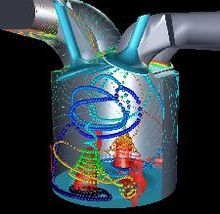Scientific computing


Scientific computing or simulation science sees itself as an interdisciplinary approach for the development of models , algorithms and software in order to be able to answer questions from the natural , engineering and economic sciences with the help of computer simulation . The High Performance Computing is a crucial key. Scientific computing combines applied mathematics , in particular numerical mathematics , as well as computer science .
The English term Computational Science and Engineering (CSE) is also used synonymously in the German language . Other terms such as scientific computing or computational science (CS) are also used to specify when natural sciences and computational engineering or computational engineering science are in focus when engineering sciences are in focus.
Sometimes engineering informatics is equated with computational engineering. However, engineering informatics sees itself as an overarching interface between informatics and engineering, since software is increasingly permeating engineering applications.
motivation
Classically, research in many natural and engineering sciences is based on two pillars, theory and experiment . In scientific computing, numerical simulation comes alongside these two pillars. The aim of scientific computing is to reduce the number of expensive experiments or to replace them completely, since scientific computing allows experiments to be carried out on the computer that would not actually be possible or would be uneconomical.
Special promotion of science and research in Germany
As part of the Excellence Initiative following were graduate schools and clusters of excellence promoted:
- RWTH Aachen : Aachen Institute for Advanced Study in Computational Engineering Science
- Technical University of Darmstadt : Graduate School of Computational Engineering (Graduate School CE)
- Heidelberg University / IWR
- University of Stuttgart the research center "Stuttgart Research Center for Simulation Technology"
The CE course at the University of Erlangen-Nuremberg and the CSE course at the Technical University of Munich are funded by the Bavarian Elite Network .
The development of the CSE bachelor's degree in Ulm is funded by the Mercator Foundation and the Volkswagen Foundation as part of the "Bologna - Future of Teaching" program. The Ulm course is a specialty due to the existing cooperation between Ulm University and Ulm University of Applied Sciences .
See also
literature
- Carsten Burstedde: What is Scientific Computing? In: Research & Teaching. March 2013, pp. 216–217. On the Internet
- Richard Crandall : Topics in advanced scientific computation. Springer-Verlag, 1996, ISBN 0387944737 .
- Richard Crandall: Projects in scientific computation. Springer-Verlag, 2000, ISBN 0387950095 .
- Richard Crandall: Introduction to scientific computation: A primer. Springer-Verlag, 2009, ISBN 0387948406 .
Web links
- Hans-Joachim Bungartz , Christoph Zenger : Scientific computing - an interdisciplinary discipline in: aviso - magazine for science and art in Bavaria , issue 1/98. [2]
Individual evidence
- ↑ Strategic further development of high-performance computing in Germany . Science Council, 2012. p. 5
- ↑ Strategic further development of high-performance computing in Germany . Science Council, 2012. p. 5
- ↑ http://berufenet.arbeitsagentur.de/berufe/start?dest=profession&prof-id=94341
- ↑ University of Augsburg : Bachelor of Computer Science , accessed on August 10, 2015 [1]
- ↑ Strategic further development of high-performance computing in Germany . Science Council, 2012. p. 5.
- ↑ Technical University of Munich : Computational Science and Engineering , Retrieved on August 9, 2015 Archived copy ( memento of the original from August 18, 2016 in the Internet Archive ) Info: The archive link has been inserted automatically and has not yet been checked. Please check the original and archive link according to the instructions and then remove this notice.
- ↑ http://www.gsc.ce.tu-darmstadt.de
- ↑ http://www.mathcomp.uni-heidelberg.de/ Heidelberg Graduate School of Mathematical and Computational Methods for the Sciences
- ↑ http://www.uni-stuttgart.de/exzellenz/news/news_0002.html